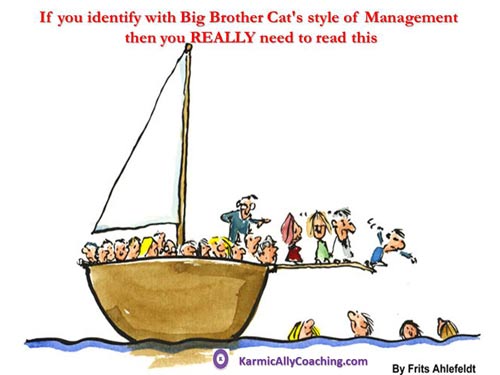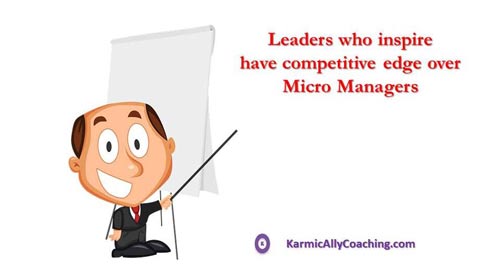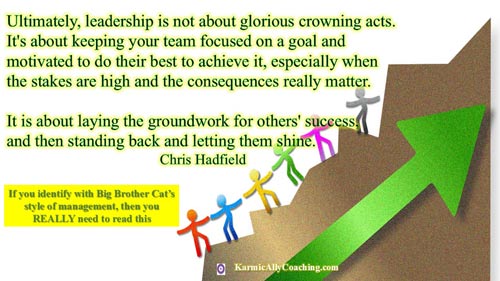This post has already been read 6574 times!

Dagley and Gaskin identified the ability to deliver key outcomes consistently as one of 10 Executive Presence Characteristics. This is also a key characteristic of a good leader.
In fact, a good leader should be able to abstain from using coercive power or his position to get the work done.
Yet, many a manager fails to demonstrate true leadership style or executive presence. Even though they get the job done, they miss out on their goal to climb to the pinnacles of their organizations corporate ladder.
When it comes to leadership, a key quality is commanding the respect of our team and demonstrating Emotional Intelligence. Looking back in time, I remember the story of Big Brother Cat.
As a manager, his use of authority led to his ultimate downfall.
True Story of a Big Brother Cat Manager and Modern-Day Slavery
A decade ago, I was the Technical Manager on a major assignment involving an AIM listing on the London Stock Exchange. Our assignment involved converting the financial statements using International Financial Reporting Standards.
The successful close of this assignment would put the firm in a different league compared to other audit and consulting firms.
Back then, the only other time these reporting standards were being used in India was for European Group Reporting assignments. This was on an annual basis for clients with Indian subsidiaries.
It was a simple template filling exercise with adjustment calculations and not reconverting 3 years of financial statements.
I was the specialist on board this assignment with a team of 12 professionals. They knew nothing about these reporting standards but were eager to learn and good team members (a major plus).
Our team also had a manager of my seniority. His role was to help facilitate client interactions while I played the hands-on manager with big time on the job training.
I noticed a pattern in the productivity cycle which had direct correlation with the presence of the other Manager, whom I shall call Big Brother Cat.
Big Brother Cat was a good person but tended to micro-manage and bring out the whip even when it was not required. His emotional intelligence quotient was not good.
To the outsider it would appear to be a game of Cat and Mice.
We had been transported to a slave ship with Mice at the oars and the Cat at the helm beating his hammer.
From a Senior Manager, I felt I had suddenly become a Head Mouse who was being challenged to keep her team morale going against all odds.
We were working on a tight schedule and putting in 12 hours a day without weekends off to rest. Having a chance to laugh was a premium stress management tool.
Big Brother Cat equated laughter with goofing. He started with the premise that subordinates could not be trusted and kept telling them exactly what he expected.
Big Brother Cat forgot we were humans working towards an impossible deadline with a learning curve that had to defy the laws of gravity.
Timely intervention by the Partner ensured that the project had a successful close. We the Mice (yes, yours truly included!) lived to work on other projects.
By chance, the entire team on that project has left the organization to pursue new pastures.
10 years later, despite our hectic lives, with the exception of Big Brother Cat, we’re still in touch and enjoy a good laugh.
Our Micro Manager too left the company. His Big Brother tendencies had become a barrier to his cherished dream of partnership.
Getting along with people is a must for a good leader.
As potential leaders, we all learned lessons.
If you are inclined to micromanage your team, then there are pitfalls you want to avoid in your quest to climb the next rung on the corporate ladder.
Leaders who inspire have competitive edge over Micro Managers

I observed that the professionals were working together satisfactorily, sharing information, and helping each other with the workload. They were hardworking mice, if only Big Brother Cat would have stepped back and taken a realistic look.
Some socializing is always a good thing. It means that the individuals are working together as a team rather than a motley group of professionals.
I believe that there has to be some socializing for effective teamwork. Relationships are built when people get to know each other, like each other and trust each other.
It is one thing to run a tight ship but a too tight noose around the employee’s neck can have far reaching repercussions. These include but are not limited to drop in efficiency, barriers to task-focus and low morale.
If it gets too much, perhaps an employee leaving for a less stressful work environment.
A good leader knows how to achieve success in projects while facilitating individual goal achievement.

Micro-management by a manager sends out the message that you don’t trust the employee or their competencies.
If your team doesn’t respect you, be sure they will not give their 100% to you which ultimately impacts your own career prospects.
Fear as a motivator loses out each time to respect and appreciation. It gets the job done but the buck stops there. Fear kills creativity and thinking outside the box.
Fear means that the Mice will do only as much as is required, but not more.
The Big Brother Cat needs to rethink its role as a Manager and change its style of managing Mice.
He needs to become a real Manager a respected boss not the ones I describe in my post, 5 Boss Personality Types every Professional needs to manage for peace of Mind .
Change has to come from within. Take a long and hard view at where you might be going wrong. Ask your peers, colleagues and if you have the stomach, even your subordinates.
Use the information to develop your social intelligence.
If you hear something uncomplimentary, take note of it but don’t let it become personal. You are asking for feedback to change, not launch a witch-hunt.
Feel the urge to interfere or micro-manage? Count to ten or do some breathing exercises.
The time lag between the urge to interfere and act will give your brain a chance to think again about what you are trying to change about yourself.
Bad habits take time to break but they are habits and habits can be changed.
Take it a step further and from time to time become one of the Mice. Join them in a joke, join them for lunch and get to know your team members. It will make you a better manager and your subordinates will benefit from knowing their Manager is human and not a robot.
While you are working at turning around your management style, here’s one tip to build instant trust with previously frightened subordinates. Try to appreciate them.
If they do something right, acknowledge it and give them well-deserved praise. It they get something wrong, use a constructive feedback process and help them do better next time.
Learn to exercise genuine power like a true Leader.
One of the best touchstones or frames of reference that I recommend using in times of doubt is a quote from Chris Hadfield,

I’m curious, do you know about any reformed Big Brother Cat Managers? Write in and tell us about it!
PS. Want to improve your Leadership Skills? This guide and planner will help you do it on your own. Click here to learn more or purchase directly by clicking on the image below.
This post was originally written in January 2013 and has been updated for relevance and more information.
Leaving The Ship by Frits Ahlefeldt






 I adhere to the Certified Coaches Alliance Code of Ethics and Standards. A copy is available on request.
I adhere to the Certified Coaches Alliance Code of Ethics and Standards. A copy is available on request.
 Let's Talk through the Connect Form:
Let's Talk through the Connect Form:
Wow, some fantastic leadership skills outlined here, and some brilliant practical tips to help people turn the way they are embodying leadership around and embark on a new and more pleasurable journey for all concerned. Thank you!
Thank you Julia! Leaders who lead by inspiration are always better than those who rely on authority.
It always astonishes me when a ‘Big Brother Cat’ walks in on a sunny, productive, harmonious day, and instantly turns it into stormy weather. It is one of the saddest things in the universe when – through their own fears – a person needs to disrupt the evident harmony and create stress its instead. And it can be very hard for that person to adjust their behavior, as they are usually convinced that by cracking the whip they are saving the day, not ruining it. Great post, and I’m so glad you had such a great team on board (the slave ship!) and that you kept your spirits up and stayed in touch all these years later. Well done, mice!
Very true, Reba. I sometimes feel that had Big Brother Cat had a better role model in the earlier stages of his career, he would have been a better leader. For sure he arranged to take the entire team out for a wonderful lunch after the assignment at one of the most expensive and happening restaurants in town at the time to acknowledge our work but even then, the Mice were worried if they should be happy or not. A lesson for every professional who dreams of being the boss his team remembers later in life – for the right reasons, of course!
As I was reading this post, Vatsala, I scanned my memory for all the bosses I’ve worked for and can’t remember any who were Big Brother Cats in their style. Most of my ‘bosses’ have been warm and compassionate and it sounds like I am lucky to have had positive experiences while working in a team. I might have doubted myself at times, being unsure if I was delivering what was expected, but by and large, my work experiences have been positive. People encouraging each other to do good work and hopefully the people who worked for me when I owned a video retail chain of stores, will remember me the same. I do know of some of these types of managers and agree completely, that fear robs everyone of not only a great work experience, but also of lifting each other up to heights they may not have obtained on their own!
You’ve been blessed during your career, Beverley, by not facing the Big Brother Cat type of boss. As young careerists, we are impressionable and emulate ur role models during the later part of our careers. When our role model is a bad one, one of 2 things happens. We either go into a reactionary mode and become the complete reverse of the original role model or believe that because we had a hard time, others should do. Quite rightly, fear is at the core of the latter type of boss.
If only professionals would understand that a rising tide raises all ships. Then we could all have great work experiences like you mentioned. Thanks for adding more insight to the conversation!
Some of this sounds very familiar Vatsala. Like most people I’ve had my share of the good, the bad and the ugly when it comes to upper management. There is one that quickly came to mind as I was reading your article – what a jerk he was. Far too many people get promoted for all the wrong reasons I’m afraid.
But I have to say that I learned more from him about the type of manager I did not want to be than from all of the others, so there was that.
I’ve seen some completely incompetent get promoted to positions that were not meant for them and then watch Murphy’s Law kick in big time, Marquita. The consequences for the organization have included good people leaving with damage control measures being implemented after the event.
These Big Brother Cat type of Managers do have a learning lesson for us, though. When we don’t know what kind of a leader we want to be or are challenged by abstract notions, it’s easier to zero in on what we don’t want to be and then reframe them in more positive and empowering words.
After working for a boss that reprimanded me for laughing (disruptive) and threw staplers and other items at employees, I vowed never to be that kind of leader. Playing on what I expected from good leader and team player, I vowed never to become what you call Big Brother Cat.
As a leader you can never expect your team to do things that you would not do on your own and that’s what I found to be one of my success factors. Another was empowering the team to assist in decision making and proactively look forward to new potential initiatives.
As the saying goes there is no I in TEAM.
I love the way you have captured the essence of the qualities that it takes to be a good leader and to demonstrate Executive Presence. Without a cohesive and happy team, there can’t be a true leader, just a Big Brother Cat whipping galley mice into working. 🙂
This struck me in the solar plexus, Vatsala. Because, well, that Big Brother Cat can sure be me–to me. I’m my own boss, and the joke around here has been for some time that I have the world’s worst boss. Cracking the whip over my own head is something I’m really good at.
But I’m fostering a better relationship with her 🙂 And she’s getting better at fostering all the different factions within me.
Thank you for this!
My pleasure, Susan! We are often our worst critics. It’s good to know that your boss is finally learning to be appreciative of you!
I have worked with Big Brother Cat….a terrible way for mice to survive, and usually to survive the mice move on and good and loyal employees are lost.
Often time Big Brother Cat needs to look deep at themselves to find why they are acting this way, and when they climb off the top shelf and realize we are all human things will usually go much smoother.
I am glad to have read this and even happier that this is not my management style… great article
A true leader will never undermine his team but will build on their strengths and talents. When faced with these kinds of boss, we have the choice of option to follow when we become the boss – follow suit or do things the way we would have wanted it to be when we were mice. I’m delighted that you practice the latter style, Lisa.
I also agree with you that the Big Brother Cat may have a deeper issue and is venting on the subordinate because of the power they hold. The worst part is that before the suffering employee leaves, they might have approached Human Resources which may not have corrected the situation in time. I’ve been there and leaving was the best option to protect my self-confidence and health. Thanks for dropping by at the blog. Do visit again!
I am a former Big 4 Senior Manager – and I ALWAYS socialised with my team and ensured they had a good time on my projects. There was no goofing off about it, it was building rapport, getting to know my team, showing an appreciation for the hours and effort that they were putting in and rewarding this in my own way. Maybe it depends on the culture of the particular firm – and even the sub-department but I found this was the management style most of my colleagues had too, no Big Brother Cats in our clowder.
Welcome to the fold, Keri. I worked for all of the Big 4 in 6 countries during my corporate world career and am still in touch with many of my then subordinates because I followed a rule that my first mentor taught me – inspire your juniors through respect not fear. I agree with you about the culture of the particular firm and sub-department which is often the key to the high attrition rates in that firm/department. Perhaps companies should focus on training managers for leadership and closing the Emotional Quotient gap where it exists. Incidentally, this particular Big Brother Cat never made partner and the entire team has since then moved onto bigger and better pastures. Thanks for visiting my blog.